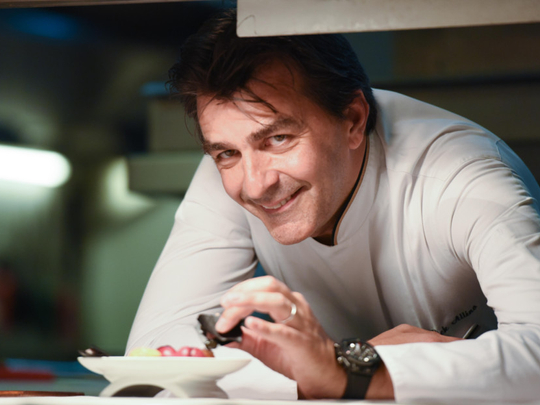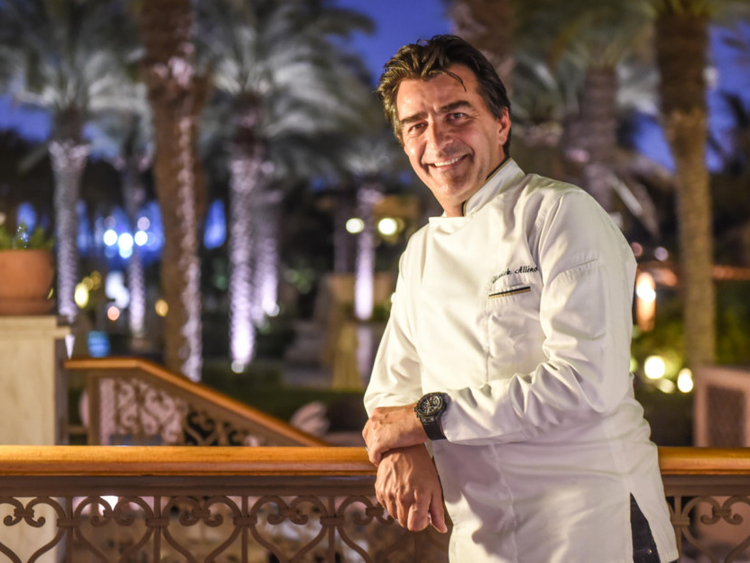
In the Experience Age, restaurant dinners not only need to enchant and entertain, they must also leave a poignant, lasting memory. Yannick Alleno seems to understand this intuitively as we found out at his exceptional restaurant, Stay, at the One & Only The Palm. During a recent Legends Menu dinner, for example, he served up scallop ravioli with caviar and a butter emulsion.
It may have been called ravioli, but it wasn’t a pasta dish. Instead, thinly sliced fresh scallops encased the Oscietra in the style of the classic pasta so that an array of flavours danced around the tongue, the caviar popping neatly against the buttery-soft seafood and each mouthful by turns sweet, salty, savoury and luxuriously creamy.
As experiences go, the dish has bookmarked itself into my memory. Even months later I can recall its flavours in detail. Both an acknowledgement of tradition and a nod to current trends, this is what French food should be in the 21st century and Alleno is one of its foremost proponents in a world where it seems we’re constantly yearning to return to the halcyon days of yore, with clean eating and hipsterised, retro versions of classic recipes.
“Today, you sear a scallop and garnish it with something you find and present it to the customer — this is not French food, that is not how food should be. It lacks heart, it lacks knowledge, it lacks history,” the Parisian chef says on a cool evening at the hotel recently. “The complexity is not there anymore. That’s not cuisine, it’s just nourishment,” he adds. Over more than an hour, we talk about his culinary approach and how he’s championing the renaissance of French food.
Alleno’s approach has been to question everything, to break the rules and raise the bar with new techniques and layered dishes. His secret weapon is sauce. In cooking, sauces aren’t just tasty liquids ladled onto steaks or puddings, they’re vehicles of flavour and moisture added during one or more stages of preparation, and can be liquid, semi-solid or creamy in consistency. Although French chefs have been sidestep sauces in recent years, declaring them too rich or heavy for modern palates, this protege of Paul Bocuse believes they’re central to fine food.
“Sauces are the link to memory. If you have a fantastic sauce you will remember that dish forever,” he says, explaining how a concentrated taste anchors the experience. That scallop ravioli, then, has done its job (and it’s entirely fitting that it should sit on a Legends Menu. These are elaborate presentations that Alleno serves up each season in two- or three-day blocks at his restaurants around the world, including here in Dubai.)
As I attempt to get to the heart of his new philosophy, we discuss his new approach to these basic condiments, which the 49-year-old gastronomic superstar laid out in his 2014 book, Sauces: Reflexions of a Chef. Rather than throw herbs and spices into a pot with water and boil down to a jus, which is then reduced to a sauce, losing its nutritive value in the process, he says the way forward is cold extraction. Using a cryo-concentration technique developed together with the team at the Centre de Recherche et d’Etudes pour l’Alimentation (the French research centre largely responsible for our love affair with sous-vide cooking), Alleno cooks each ingredient under low heat to its finest point. This varies according to the raw material; peas, for example, need four hours at 64 degrees. He then distills that concentrate further by freezing the excess water and separating the ingredient’s essence in a centrifuge.
A deceptively simple roasted mango pudding on the regular menu at Stay is the perfect example. Pastry chef Sohel comes over to our table to explain it: they top fresh mango with mango sauce and bake it for close to an hour before serving it topped with passionfruit sorbet. Suffice to say it’s mango like you’ve never eaten it before (and I say this at the height of the Indian alphonso mango season); unfortunately I’m too full to order a second dessert, although I desperately want to.
“What’s happened with food today is what we had in France or mainland Europe in the 15th century, when they went into the forests to hunt, they picked things off the trees, and barbecued their food and ate it. It’s pleasant, it’s fantastic, but this is not cuisine,” Alleno declaims, before pausing and then apologising for his political views.
When chefs say to me that everything comes down to good produce — that taking care of their supplies takes care of the taste of the final dish — I often wonder why they’ve got a job in that case. Alleno nods in agreement when I say this. “Exactly. Chefs are like winemakers. Of course you have to have grapes and sunlight and landscape, but you have to work at it every single day. You have to capture the truth of the planet in a bottle. That’s how you achieve a grand vin. It’s the same with chefs,” he says.
He brought a similar approach to his second book in the Reflexions series, Terroirs, about the complex factors that affect the characteristics of a crop, as seen through the lens of fermented foods. His view is that terroir should no longer be considered as simply a geographical area, but rather as a signature of unique taste. “Terroir is a triangle. Of product, landscape and savoir faire,” he says. (He’s begun work on the next in the series, which he expects to be finished in 2019, but frustratingly won’t discuss its central theme.)
Over the course of our conversation — determinedly without interruption from our cell phones — we wander off into history and art, sustainability and geophysics, as we talk about food and about the way we eat today, as Alleno seeks to illustrate and explain his philosophy. We touch on Catherine de Medici and her contribution to French gastronomy, about telluric currents and their impact on ice cream, and discuss internet searches and how they shape food trends. It’s easy to dismiss him as a talented chef who has traded on his good looks, but even a casual chat with him requires an extensive reading list, and I am at last able to understand how one of the world’s top culinary players can also do double duty as a hotel’s executive chef (he runs the kitchens at One & Only The Palm Dubai from his Paris headquarters).
Of all the chefs I’ve interviewed over the course of this column, Alleno is most like an artist, and he’s an artist at the top of his game. He knows this — he talks about spearheading a culinary revolution with his methods — and yet, he seems constantly in search of a new idea, for a new experience that will inform and elevate his art.
“Today, to be honest, 80 to 90 per cent of my experiences are the same. But that 10 per cent of knowledge is what you need to give you the opportunity to create a dish you’ve never tried before,” he confides.
At the intersection of these passions sits his newest venture, Allenoteque, an all-in-one enoteca, bistro and art gallery set to open in Paris this month. Expect a small restaurant with very good chefs, plenty of locally sourced produce, and some exquisite technique. But until your next trip to Paris, you’ll want want to Stay awhile at his Dubai restaurant.
———————————
Who is Yannick Alleno?
Rated among the top chefs in the world by his peers, Yannick Alleno doesn’t believe in signature dishes. When something is a signature, you stop growing, he says. That attitude goes a long way to explain why the 49-year-old, nicknamed the Prince of the Palaces by the French press, is rated among the best chefs in the world by his peers — he was No 2 on Le Chef’s 2017 poll of chefs at the helm of two- and three-star restaurants, only behind Michel Troisgros and ahead of heavyweights such as Pierre Gagnaire and Alain Ducasse.
Alleno knew he wanted to be a chef at the age of eight, and was working in professional kitchens by the time he was 15, training with Gabriel Biscay, Roland Durand and Martial Henguehard and Louis Grondard. In 1999, he placed second in the Bocuse d’or championship, and Paul Bocuse recommended him to run Hotel Scribe’s restaurant in Paris, for which he was able to win two Michelin stars. He then went on to run the kitchens at Hotel Le Meurice, one of Paris’s grandest palaces, before launching a consultancy in 2008, and launching restaurants in Courcheval, St Tropez, Marrakech, Beijing, Taipei and Dubai. He took over the legendary Pavillon Ledoyen in Paris in 2014, taking it to three Michelin stars the following year, a feat he repeated at Le 1947 at Cheval Blanc Courchevel last year.
Over the years his cuisine has come to be defined by his reinterpretation of classic recipes in surprising, inventive ways.
————————————————
Don’t miss it
Yannick Alleno’s Legends Dinner takes place at Stay, One&Only The Palm Dubai on two nights only, on May 7 and 8. Highlights include crusty Belon oysters with gold Oscietra caviar, milk-fed veal tartare, Stroganoff-inspired Wagyu and crunchy chocolate leaves. Pricing begins at Dh680 per person for four courses.













